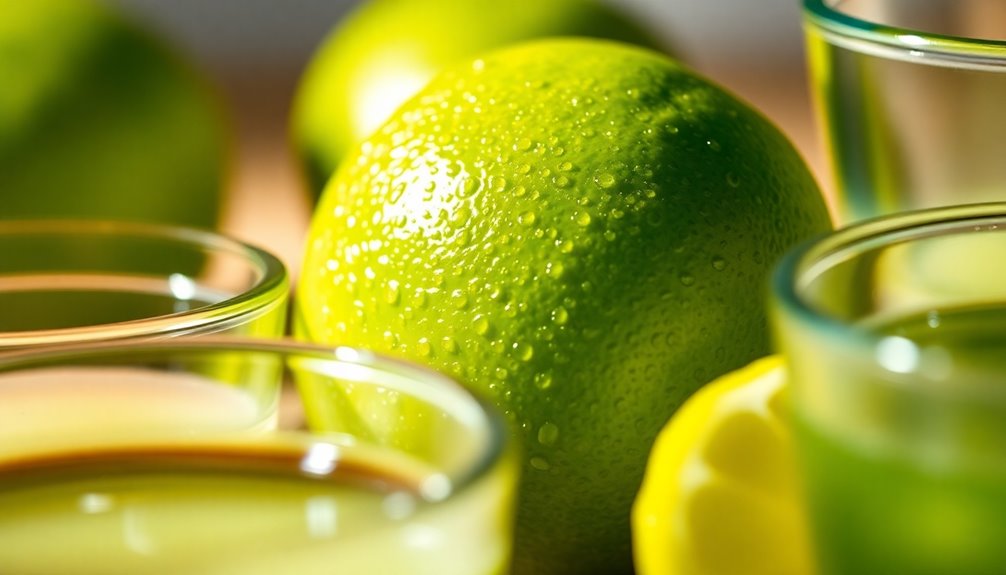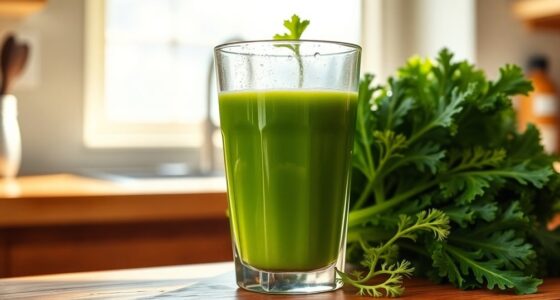One medium lime typically yields about 1 to 2 ounces of fresh juice, making it a juicy addition to your dishes. If you're looking for ways to maximize that juice, selecting firm, heavy limes with smooth rinds will help. Rolling them before cutting and warming them slightly can also boost extraction. Fresh lime juice has a vibrant flavor that bottled options just can't match. Curious about other tips? You'll want to keep exploring what limes can bring to your kitchen!
Key Takeaways
- One medium lime typically yields about 1 ounce (2 tablespoons) of fresh lime juice.
- Juiciness varies; Persian limes generally produce more juice than Key limes.
- Optimal juicing occurs at room temperature, so warm limes yield more juice.
- Rolling the lime before cutting helps soften it for maximum juice extraction.
- For 1/4 cup of lime juice, approximately 2 limes are needed.
How Much Juice Can You Expect From One Lime?
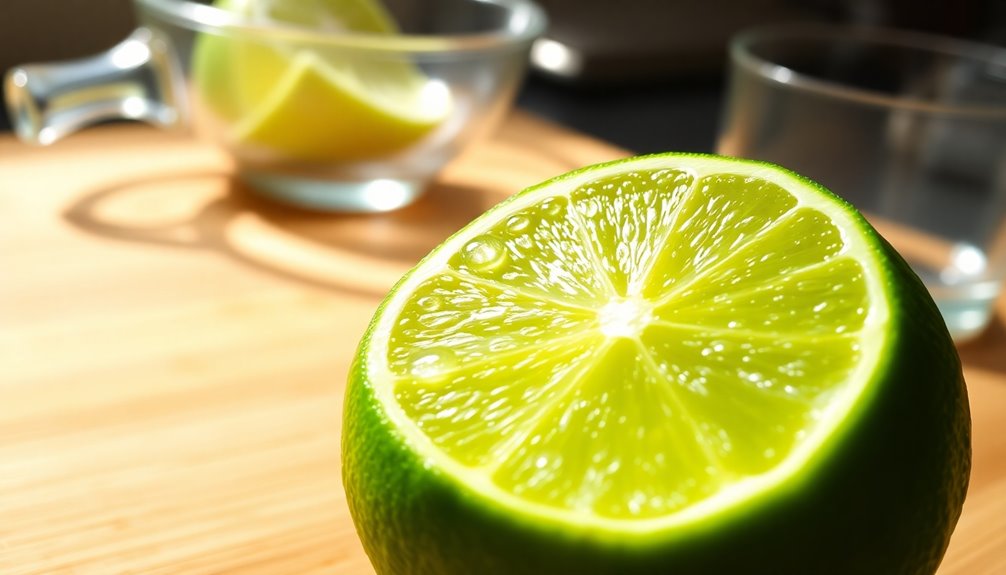
Have you ever wondered how much juice you can squeeze from a single lime? On average, one medium lime yields about 2 tablespoons, or 1 ounce, of fresh lime juice. This amount remains consistent, regardless of the lime's size.
If a recipe calls for 1/4 cup of lime juice, you'll need around 2 limes to meet that requirement. Fresh lime juice is essential for enhancing flavors in cocktails and various culinary dishes, making it a must-have in your kitchen.
Additionally, if you're looking to add some zest, remember that one lime is equivalent to 2 teaspoons of lime zest. So, when you juice a lime, you're not just getting juice; you're adding vibrant flavor to your recipes!
Tips for Selecting the Perfect Lime
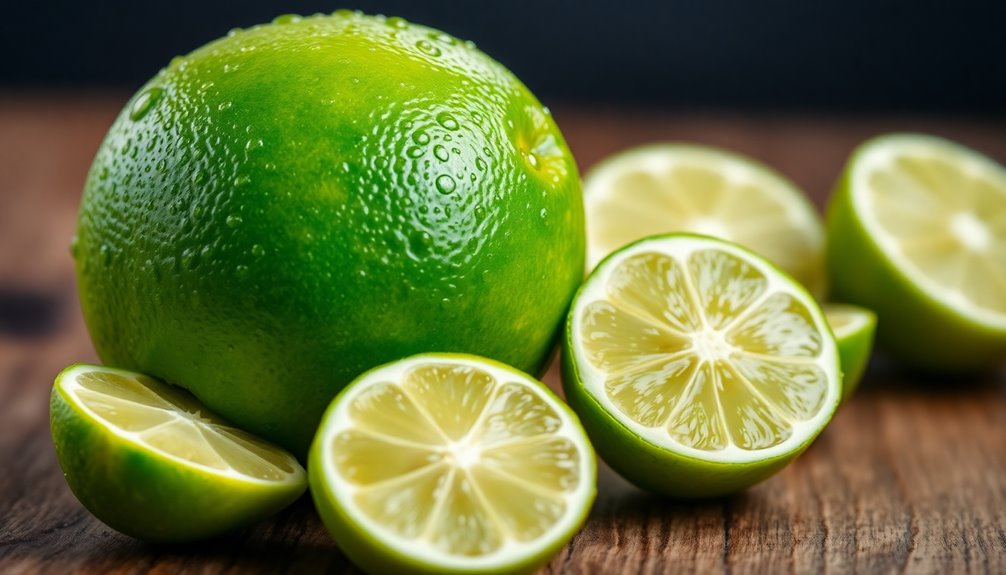
When it comes to enhancing your recipes with lime juice, selecting the right lime is key. When you're at the grocery store, look for firm limes with a smooth rind, as these are often juicier and fresher.
Heavier limes typically contain more juice, so choose those that feel substantial in your hand. Riper limes are usually greener, which indicates better flavor and yield.
Remember, size doesn't matter as much as weight when you pick limes; focus on how heavy they feel. Finally, check for limes without brown spots or blemishes to guarantee you're choosing the best quality.
These tips will help you find the perfect limes and make the best way to juice them even better!
Juicing Techniques for Maximum Yield
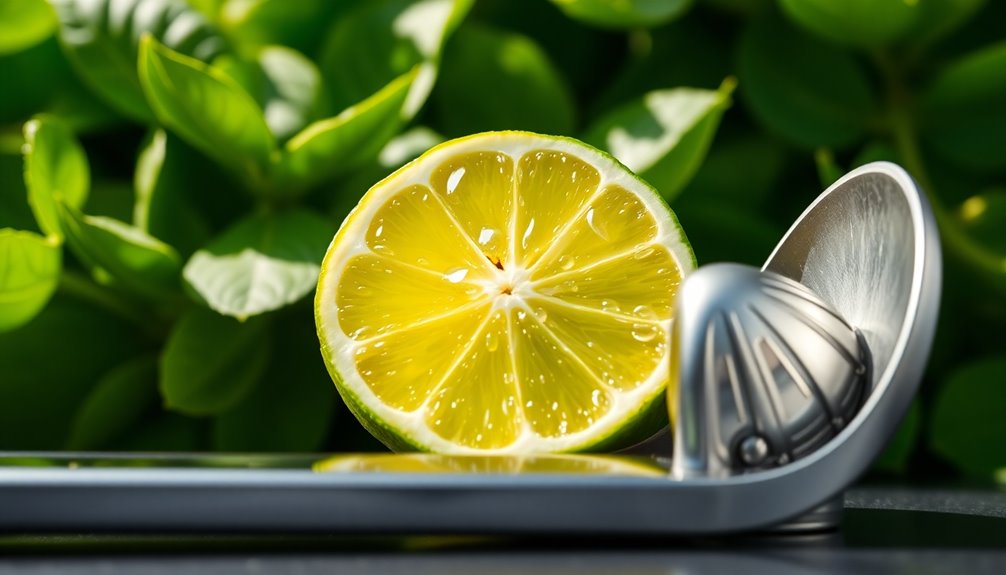
When it comes to juicing limes, the right cutting methods and tools can make a big difference in your yield.
You'll want to roll the lime before cutting it and use a manual reamer for the best results.
With these techniques, you can maximize every drop of juice from your lime. Additionally, using essential oils for sinus congestion relief can create a refreshing atmosphere while you juice.
Optimal Cutting Methods
To get the most juice from a lime, you'll want to use a few key cutting techniques. First, roll the lime on your cutting board to soften it; this helps maximize juice yield.
Next, cut the lime in half crosswise with a sharp knife, giving you better access to the juice-filled flesh. When juicing, position those halves with the flesh facing down for peak extraction.
You can also microwave the lime for about 20 seconds before cutting, which enhances juice extraction even further. For the best results, use a manual reamer or citrus juicer, since these tools help you get more juice than just hand-squeezing.
Effective Juicing Tools
After mastering the ideal cutting methods, it's time to explore the tools that can enhance your juicing experience. To squeeze a lot from your limes, consider using the following effective juicing tools. You can find most of these at grocery stores for convenience.
| Tool | Description | Benefits |
|---|---|---|
| Manual Reamer | Simple tool for hand juicing | Maximizes juice extraction |
| Electric Juicer | Motorized for efficient juicing | Quick and less effort required |
| Juicing Press | Leverages force for maximum yield | Extracts more juice |
| Fine Strainer | Removes seeds and pulp | Guarantees smooth juice |
| Microwave | Softens limes for easier juicing | Increases juice yield |
Utilizing these tools will help you get the most out of each lime!
Fresh Lime Juice vs. Bottled Lime Juice
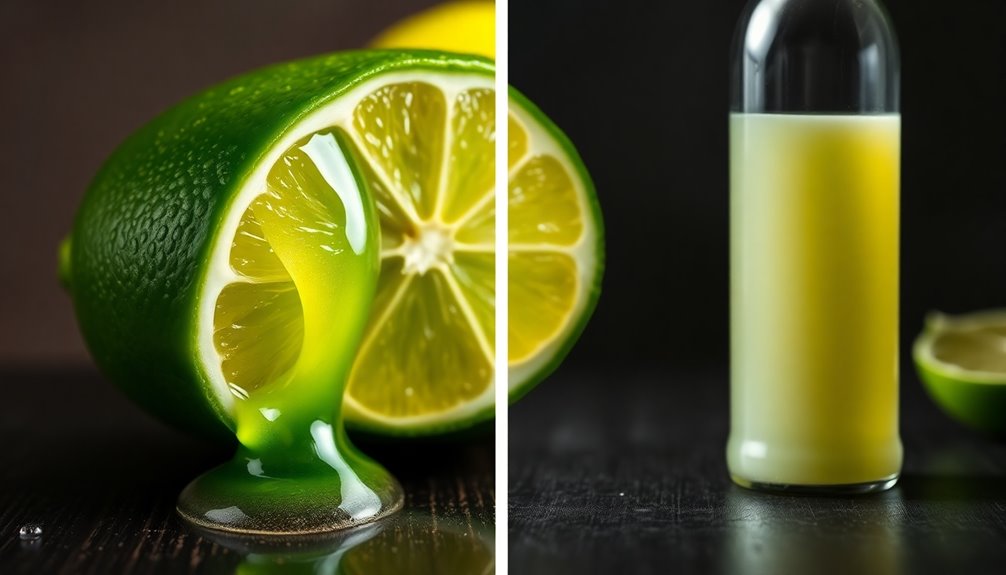
When you compare fresh lime juice to bottled options, the flavor profile stands out considerably.
Fresh juice delivers a vibrant, robust taste that elevates your recipes, while bottled juice tends to lack that complexity.
Understanding these differences can help you choose the right lime juice for your culinary creations.
Flavor Profile Comparison
While you might reach for bottled lime juice for convenience, fresh lime juice offers a vibrant flavor that can elevate your dishes and drinks.
The flavor profile of fresh lime juice is brighter and more dynamic, enhancing everything from cocktails to culinary delights. When you're making a classic Key lime pie or invigorating margaritas, fresh lime juice is the way to go.
It brings a complexity that bottled alternatives simply lack, often due to pasteurization and preservatives. Plus, the strong floral quality of Key lime juice sets it apart from standard citrus fruit juices, making it a favorite for gourmet cooking and mixology.
For the best taste experience, always opt for fresh lime juice when possible.
Freshness and Quality
Although bottled lime juice may be convenient, nothing compares to the freshness and quality of freshly squeezed lime juice. When you cut a lime in half and squeeze, you typically get about 1 ounce of vibrant juice that brightens your dishes and cocktails.
This fresh juice offers a complex flavor profile that bottled versions simply can't match. Pasteurized and filled with preservatives, bottled lime juice delivers a flatter taste, lacking the dynamic qualities of fresh juice.
Plus, don't forget about the zest! You can get about 2 teaspoons of strong, flavorful zest per lime, enhancing your recipes even further.
When it comes to quality, freshly squeezed lime juice is always the better choice. Additionally, using fresh ingredients can help avoid nutrient deficiencies that may arise from relying on processed products.
Usage in Recipes
Fresh lime juice plays an essential role in elevating the flavor of various recipes, standing out against its bottled counterpart. Typically, juice from one lime yields about 1 ounce, offering a vibrant flavor that notably enhances cocktails and dishes.
When making a margarita or Key lime pie, fresh lime juice is key to achieving that bright, zesty taste you crave. Bottled lime juice, often pasteurized and filled with preservatives, can't compete with the complexity of fresh juice.
If your recipe requires lime zest, remember that one lime gives you about 2 teaspoons, which can further boost your dish's flavor profile when paired with fresh lime juice. Always opt for fresh when you can for the best results! Additionally, using fresh lime juice can enhance the flavor of breakfast dishes by adding a zesty kick to your morning meals.
Understanding Lime Zest and Its Uses
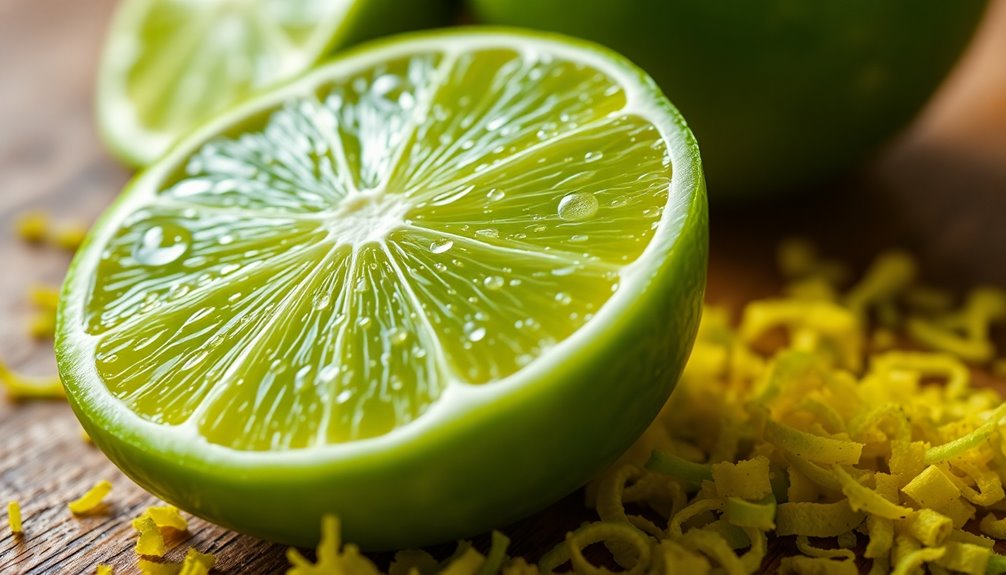
Lime zest adds a vibrant burst of flavor to your dishes, elevating both sweet and savory recipes. With its intense flavor profile, lime zest can transform your meals in delightful ways.
Here are some great uses for lime zest:
- Enhance marinades for meats and fish
- Brighten up baked goods like cakes and cookies
- Add zest to salad dressings for a revitalizing kick
- Infuse cocktails with a zesty twist
- Sprinkle over tacos or guacamole for extra flavor
One medium lime typically yields about 2 teaspoons of zest, making it a valuable ingredient.
Storage Tips for Limes and Lime Juice

To make the most of your lime zest and juice, proper storage is key. Follow these storage tips to keep your limes and fresh lime juice in top condition:
| Storage Method | Duration | Signs of Spoilage |
|---|---|---|
| Whole Limes | Room temperature | Brown spots, excessive dryness |
| Cut Limes | Airtight container | Drying out, discoloration |
| Fresh Lime Juice | Refrigerate (up to a week) | Off smell, separation |
| Frozen Lime Juice | Ice cube trays (months) | Ice crystals, off taste |
| Refrigerated Limes | Avoid if possible | Hardness, reduced juiciness |
Keep an eye on your limes for signs of spoilage to guarantee they stay juicy and flavorful!
Frequently Asked Questions
How Many Oz Is the Juice of One Lime?
When you’re squeezing a medium lime, you can expect to get about 1 ounce, or 2 tablespoons, of juice. To maximize the amount of juice you extract, make sure to roll the lime on a countertop before cutting it open; this helps to break down the cells and release more liquid. If you’re planning on making cocktails or a refreshing drink, keep in mind that most juice glasses typically hold about 8 to 12 ounces, so it’s helpful to know how many ounces in a juice glass for measuring your ingredients. This way, you can ensure your drink has the perfect balance of flavors! Additionally, if you’re using fresh lime juice in recipes, consider the importance of freshness; the taste of freshly squeezed juice can significantly elevate your dish or drink. Remember, if you’re making a batch of margaritas or a zesty salad dressing, knowing how many ounces in a juice glass can help you scale your ingredients accurately. This ensures that every sip and bite is bursting with flavor and perfectly proportioned.
This makes it pretty straightforward to estimate how much juice you'll need for your recipes.
If you're planning to use lime juice in larger quantities, remember that about 2 limes will give you 1/4 cup, while 8 limes will provide a full cup.
Fresh juice really does make a difference in flavor!
How Can You Tell if a Lime Is Juicy?
Picture a vibrant green lime, its smooth skin glistening under the light.
To tell if it's juicy, pick it up; a heavier feel often means more juice inside. Gently press it—if it yields slightly, you've got a winner.
Look for that rich green color, avoiding any brown spots that scream spoilage. A firm lime that feels just right is your best bet for a zesty, flavorful squeeze.
Enjoy the freshness!
How Much Juice Is in One Key Lime?
When you're squeezing a Key lime, you can expect to get about 1 tablespoon, or 0.5 ounces, of juice from one lime.
Since they're smaller than Persian limes, you might need 4 to 5 Key limes to match the juice volume of just one medium Persian lime.
Their tartness and floral notes make them perfect for desserts, so keep that in mind when you're cooking or baking!
How Much Lime Juice Concentrate for 1 Lime?
When you think about fresh lime juice versus lime juice concentrate, the difference in flavor is striking.
For one lime, you'll need about 1 tablespoon of concentrate to achieve a similar taste.
Keep in mind, though, that concentrate is more potent and might contain preservatives that can change the flavor.
Always taste as you go; adjusting the amount to suit your personal preference guarantees your dish remains vibrant and delicious.
Conclusion
In the world of limes, each fruit is a small sunburst, promising a zesty brightness to your dishes. By understanding how much juice you can extract and selecting the juiciest limes, you're not just crafting recipes; you're infusing life into your meals. Remember, fresh lime juice shines like a beacon of flavor, while proper storage keeps that brightness alive. So, embrace the lime's essence, and let its vibrant spirit elevate your culinary adventures!
Cindy thoroughly researches juicing trends, techniques, and recipes to provide readers with practical advice and inspiration. Her writing style is accessible, engaging, and designed to make complex concepts easy to understand. Cindy’s dedication to promoting the advantages of juicing shines through her work, empowering readers to make positive changes in their lives through the simple act of juicing.

